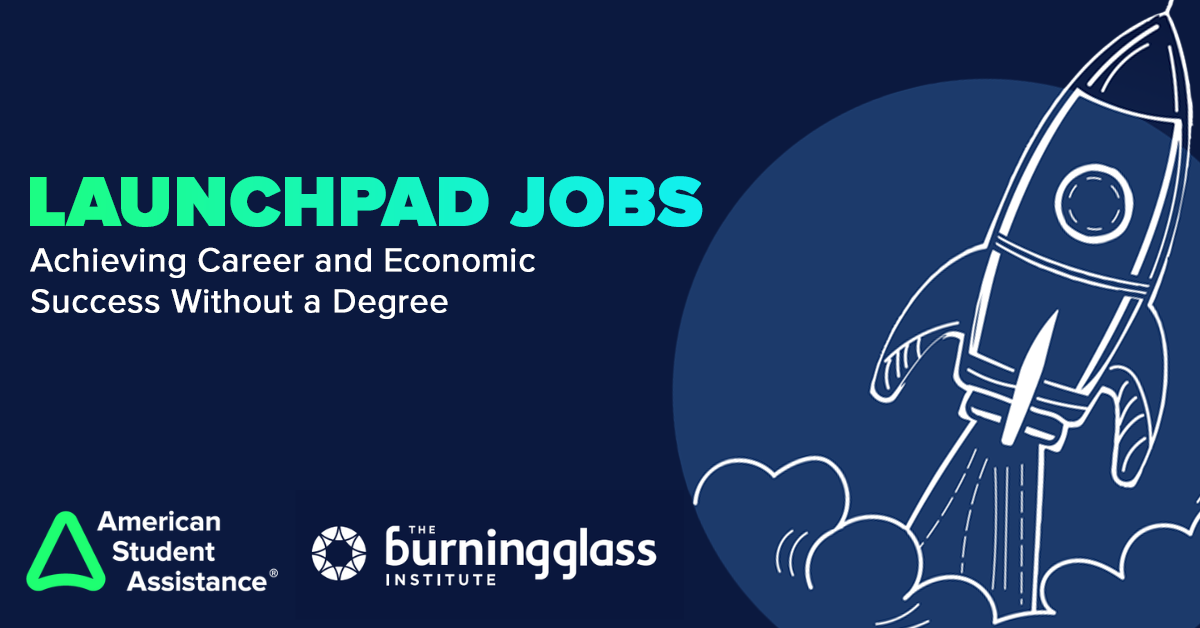While trade apprenticeships have been around for centuries, nondegree pathway programs have only recently gained traction in professional occupations such as IT, health care, education, and business management. Apprenticeships, as well as other education-to-career pathways like bootcamps, certificates, certifications, and licenses, provide young people with the opportunity to learn skills, gain hands-on experience, and build social capital at a fraction of the cost and time needed to earn a college degree.
But are nondegree pathway participants really seeing the benefits? How are these programs preparing them for successful careers, meeting needs that traditional college programs aren’t addressing, and being discovered early enough that students can make informed decisions about their post-high school plans?
To answer these questions and more, American Student Assistance® (ASA) and Jobs for the Future (JFF) commissioned an independent research study of 1,100 non-college youth to learn about their post-high school experiences. The survey explores the perceptions, feelings, and choices of three groups of students pursuing a nondegree postsecondary program. The three groups of learners surveyed include: Non-college youth: Those neither enrolled nor graduated from a college (encompasses all survey respondents); Pathway youth: Those who pursued or are pursuing any nondegree postsecondary pathway (describes 558 of survey respondents); and Non-pathway youth: Those who didn’t pursue or aren’t pursuing any nondegree postsecondary pathway (describes 561 of survey respondents).
In this first of a three-part series on the survey results, we’ll dive into how pathway program participants and alumni compare to young people who have not participated in any postsecondary education-to-career programs.
Pathway programs build confidence
When asked how confident they felt in their post-high school plans, 70% of pathway youth reported they were very or somewhat confident in knowing what steps they needed to take. In contrast, only 57% of non-pathway youth expressed the same level of confidence.
Among young people pursuing pathways, Black youth expressed the most confidence with 33% reporting they felt “very prepared” versus 24% of white youth.
Jordan, a 23-year-old Black man living in Boston, participated in Year Up, a skills-focused, career-aligned training program. He described his experience by saying the program “…has prepared me to do everything I wanted to do in life.”
Pathway youth feel workforce ready
While perception is not the same as reality, young people enroll in pathway programs to enhance their career readiness. So it is important that they feel they are learning the technical and durable skills, gaining the real-world experience, and building the networks they need for successful careers.
More than seven in ten (71%) of pathway youth report being prepared for the workforce. Yet some have found that employers still favor job applicants with a college degree.
Nadia, a contract UX designer for a large multinational technology company in Rhode Island, completed a yearlong apprenticeship program where she learned the fundamentals of design and had hands-on experience applying what she learned. She is currently a contract worker and is looking for a full-time role but has been rejected by several employers that require a college degree. “The piece of paper is still really important,” she explained.
Pathway participants and alumni report higher employment rates
A major benefit of some pathway programs like apprenticeships is that participants can earn while they learn. Others, such as certificates or credentials, can be completed in months rather than years. These are important considerations for many of today’s youth who can’t afford high college tuition rates or to forgo a salary to pursue a degree.
In fact, 65% of pathway youth said they are working full- or part-time, versus 51% of non-pathway youth. Take Yssa, a 23-year old in New York City, for example. She enrolled in a tuition-free, six-month, intensive web development boot camp called Opportunity College, where she learned both technical and soft skills. “I wanted quick results,” she explained. And she got them, finding employment right away.
Pathways provide a recipe for career success
Based on the responses of young people who are pursuing or have pursued nondegree, education-to-career opportunities, pathways programs are preparing them for career success. They are more confident in their career plans, are enhancing their workforce readiness, and are more likely to be employed than their peers who chose not to pursue postsecondary education opportunities.
To explore why more young people are choosing pathway programs over college degrees, and how satisfied they are with their choice, stay tuned for the next blog in our series. In the meantime, you can watch this recent webinar recording detailing the key findings of the Success Redefined Report, including a young adult who pursued a nondegree pathway.



